- Home
- Lisa Gardner
Love You More Page 7
Love You More Read online
Page 7
“The pattern of the water stain told you where Sophie is?”
“No. Given that Tessa Leoni’s lawyer hasn’t magically called with permission to interview her yet, we’re gonna focus on Brian Darby. I want to talk to his boss. I want to know exactly what kind of man needs to color-code his closet and Peg-Board his garage.”
“A control freak.”
“Exactly. And when something or someone undermines that control-”
“Just how violent does he get,” Bobby finished for her. They stood in the middle of the garage.
“I don’t think a stranger abducted Sophie Leoni,” D.D. stated quietly.
Bobby paused a heartbeat. “I don’t think so either.”
“Meaning it’s him, or it’s her.”
“He’s dead.”
“Meaning, maybe Trooper Leoni finally wised up.”
8
A woman never forgets the first time she is hit.
I was lucky. My parents never whacked me. My father never slapped my face for talking back, or spanked my behind for willful disobedience. Maybe because I was never that disobedient. Or maybe, because by the time my father got home at night, he was too tired to care. My brother died and my parents became shells of their former selves, using up all their energy just getting through the day.
By the time I was twelve, I’d come to terms with the morbid little household that passed as my own. I got into sports-soccer, softball, track team, anything that would keep me late after school and minimize the hours I spent on the homefront. Juliana liked sports, too. We were the Bobbsey twins, always in uniform, always rushing off somewhere.
I took some hits on the playing field. A line drive to the chest that knocked me flat on my back. I realized for the first time that you really do see stars when the breath has been knocked from your lungs and your skull ricochets against the hard earth.
Then there were miscellaneous soccer injuries, a head butt to the nose, cleats to the knee, the occasional elbow to the gut. Take it from me, girls can be tough. We dish out and man up with the best of them, particularly in the heat of battle, trying to score one for our team.
But those injuries were nothing personal. Just the kind of collateral damage that happens when you and your opponent both want the ball. After the game, you shook hands, slapped each other on the butt, and meant it.
First time I really had to fight was at the Academy. I knew I would receive rigorous training in hand-to-hand combat and I was looking forward to it. A lone female living in Boston? Hand-to-hand combat was an excellent idea, whether I made it as a trooper or not.
For two weeks, we practiced drills. Basic defensive stances for protecting our face, our kidneys, and, of course, our sidearms. Never forget your weapon, we were lectured again and again. Most cops who lose their gun are then shot and killed with that gun. First line of defense, subdue the offending party before ever getting within arm’s length. But in the event things go sour and you find yourself in a personal combat situation, protect your weapon, and strike hard first chance you get.
Turned out, I didn’t know how to deliver a punch. Sounded easy enough. But I fisted my hand wrong, had a tendency to overuse my arm, versus throwing my whole body behind the blow by rotating at the waist. So there were a couple more weeks, teaching all of us, even the big guys, how to pack a punch.
Six weeks into it, the instructors decided we’d had enough drills. Time to practice what they’d preached.
They divvied us up into two teams. We all donned protective padding and, to start, were armed with padded bars the instructors affectionately referred to as pogo sticks. Then, they turned us loose.
Don’t believe for a second I got to fight another woman of my approximate size and weight. That would be too easy. As a female officer, I was expected to handle anything and anyone. So the trainers made their picks deliberately random. I ended up across from another recruit, named Chuck, who was six one, two hundred and forty pounds, and a former football player.
He didn’t even try to hit me. He just ran straight at me and knocked me flat on my ass. I went down like a ton of bricks, remembering once more that line drive to my chest as I struggled to regain my breath.
The instructor blew his whistle. Chuck offered me a hand up, and we tried again.
This time, I was aware of my fellow recruits watching. I registered my instructor’s scowl at my disappointing performance. I fixated on the fact this was supposed to be my new life. If I couldn’t defend myself, if I couldn’t do this, I couldn’t become a trooper. Then what would I do? How would I earn enough money for Sophie and me to live? How would I provide for my daughter? What would happen to us?
Chuck rushed. This time, I stepped to the side and slammed my pogo stick into his gut. I had approximately half a second to feel good about myself. Then two hundred and forty pounds of Chuck straightened, laughed, and came back at me.
It got ugly after that. To this day, I don’t recall it all. I remember starting to feel genuinely panicked. That I was blocking and moving, and putting my shoulder behind the blow, and still Chuck kept coming and Chuck kept coming. Two hundred and forty pounds of linebacker against my one hundred and twenty pounds of desperate new motherhood.
The padded end of his pogo stick connecting with my face. My head snapped back as my nose absorbed the blow. I staggered, eyes flooding with instant tears, off balance, half-blinded, wanting to fall, but realizing frantically that I couldn’t go down. He’d kill me. That’s how it felt. Couldn’t go down or I’d be dead.
Then, at the last second, I did fall, into a tight little ball that I then sprang out of, straight into the towering giant’s legs. I caught him at the knees, jerked sideways, and toppled him like a redwood.
The instructor blew the whistle. My classmates cheered.
I staggered to standing, touching gingerly at my nose.
“That’s gonna leave a mark,” my instructor informed me cheerfully.
I crossed to Chuck, offered him a hand up.
He accepted gratefully enough. “Sorry ’bout the face,” he said, looking sheepish. Poor big guy, having to take on the girl.
I assured him it was all right. We were all doing what we had to do. Then we got to square off against new partners and do it all over again.
Later that night, curled up alone in my dorm room, I finally cradled my nose with my hand and cried. Because I didn’t know if I could go through that again. Because I wasn’t sure if I was really prepared for a new life where I had to hit and be hit. Where I might honestly have to fight for my life.
At that moment, I didn’t want to be a trooper anymore. I just wanted to go home to my baby girl. I wanted to hold Sophie and inhale the scent of her shampoo. I wanted to feel her chubby little hands pressed against my neck. I wanted to feel my ten-month-old daughter’s unconditional love.
Instead, I got pummeled the next day, and the day after that. I endured bruised ribs, whacked shins, and aching wrists. I learned to take a blow. I learned to deliver in kind. Until by the end of the twenty-five-week course, I came out of the gate swinging with the best of them, covered in purple welts but ready to rumble.
Tiny, fast, and tough.
Giant Killer, my fellow recruits called me, and I was proud of the nickname.
I remembered those days now, as the doctor examined the results from the CT scan, then gently probed the mass of swollen purple flesh around my eye.
“Fracture of the zygomatic bone,” he murmured, adding for my benefit: “Your cheek is broken.”
More perusing of film images, more inspection of my skull. “No sign of hematoma or contusion of the brain. Nausea? Headache?”
I murmured yes to both.
“Name and date.”
I managed my name, blanked on the date.
Doctor’s turn to nod. “Given the clear CT scan, it would seem you have only a concussion to go with your fractured zygomatic. And what happened here?” He finished with my head, moving to my torso, where the yellow and gr
een remnants of a fading bruise covered half my ribs.
I didn’t answer, just stared at the ceiling.
He palpitated my stomach. “Does this hurt?”
“No.”
He rotated my right arm, then my left, searching for further signs of damage. He found it on my left hip, another deep purple bruise, this time in the shape of a rounded arc, like what might be formed from the toe of a work boot.
I’d seen bruises in the shape of men’s rings, watch faces, even an imprint of a quarter on a female who’d been slugged by a boyfriend holding a roll of coins. Judging by the doctor’s face, he’d seen it all, as well.
Dr. Raj smoothed my gown back in place, retrieved my medical chart, made some notes.
“Cheek fracture will heal best if left alone,” he stated. “We’ll keep you overnight to monitor the concussion. If your nausea and headache have subsided by morning, chances are you may go home.”
I didn’t say anything.
The doctor stepped closer, cleared his throat.
“There is a bump on your left sixth rib,” he stated. “A fracture I suspect did not heal correctly.”
He paused as if waiting for me to say something, perhaps a statement he could enter into my medical chart: Patient says husband knocked her down and kicked her in the ribs. Patient says husband has a favorite baseball bat.
I said nothing, because statements became records, and records became evidence that could be used against you.
“Did you wrap your ribs yourself?” the doctor asked.
“Yes.”
The doctor grunted, my one admission filling in all his blanks.
The doctor saw me as a victim, just as the EMT had seen me as a victim. They were both wrong. I was a survivor and I was currently walking a tightrope where I absolutely, positively could not afford to fall.
Dr. Raj studied me again. “Rest is the best medicine for healing,” he said finally. “Given your concussion, I cannot prescribe a narcotic, but I will have a nurse bring you some ibuprofen for the pain.”
“Thank you.”
“In the future,” he said, “should you injure your ribs, please come to me immediately. I would like to see them better wrapped.”
“I’ll be all right,” I said.
Dr. Raj did not appear convinced. “Rest,” he repeated. “The pain and the swelling will subside soon enough. Though I have a feeling you already know that by now.”
The doctor departed.
My cheek burned. My head throbbed. But I was satisfied.
I was awake, I was lucid. And finally, I was alone.
Time to plan.
My fingers fisted against the sheets. I studied the ceiling tiles with my one good eye, and used my pain to steel my resolve.
A woman remembers the first time she is hit. But with any luck, she also remembers the first time she fights back and wins.
I am the Giant Killer.
Just gotta think. Just gotta plan. Just gotta get one step ahead.
I could do this. I would do this.
All I want for Christmas is my two front teeth, my two front teeth, my two front teeth.
Then, I rolled onto my side, curled up in a ball, and wept.
9
When D.D. wasn’t overseeing an interagency taskforce charged with solving a murder and rescuing a child, she led a three-man squad in Boston’s homicide unit. Her first squadmate, Phil, was the quintessential family man, married to his high school sweetheart and raising four kids. Her other squadmate, Neil, was a lanky redhead who’d formerly served as an EMT before joining the BPD. He had a tendency to handle the autopsies for the team, spending so much time at the morgue that he was now dating the ME, Ben Whitley.
D.D. had a whole taskforce at her disposal; she still preferred to go with what she knew. She put Neil in charge of Brian Darby’s autopsy, currently scheduled for Monday afternoon. In the meantime, Neil could start pestering the medical staff overseeing Tessa Leoni’s care to determine the extent of her current injuries as well as any medical history of past “accidents.” She assigned Phil, their data cruncher, to run the computer background checks on Brian Darby and Tessa Leoni. And, of course, get her the information on Brian Darby’s employer, immediately.
Turned out, Brian worked for Alaska South Slope Crude, otherwise known as ASSC. Head offices were in Seattle, Washington, and not open on Sunday. This did not suit D.D. She chewed the inside of her cheek while sitting in the command van, nursing a bottle of water. The initial crush of officers had subsided. Most of the neighbors had drifted off, leaving the usual assortment of “didn’t see nothing, don’t know anything” mutterings in their wake. Now only the media remained, still ensconced across the street, still clamoring for a press conference.
D.D. was probably going to have to do something about that, but she wasn’t ready yet. She wanted something to happen first. Maybe a breaking lead she could dangle in front of the hungry hordes. Or a new piece of information that would enable the media to work on her behalf. Something. Anything.
Crap, she was tired. Really, truly, bone deep, could curl up on the command center floor and fall asleep right now sort of tired. She couldn’t get used to it. The intense bouts of nausea followed by the nearly deadening sense of fatigue. Five weeks late and her body already wasn’t her own.
What was she going to do? How could she tell Alex, when she still didn’t know how she felt about it herself?
What was she going to do?
Bobby, who’d been in earnest conversation with his lieutenant colonel, finally broke away and took a seat beside her. He stretched out his legs.
“Hungry?” he asked.
“What?”
“It’s after two, D.D. We need lunch.”
She looked at him blankly, not quite believing it was after two and definitely not ready to deal with all the current issues that surrounded mealtimes.
“You okay?” He asked it evenly.
“ ’Course I’m okay! Just… preoccupied. In case you haven’t noticed, we’re still missing a six-year-old girl.”
“Then I have a gift for you.” Bobby held out a piece of paper. “The lieutenant colonel just had this faxed over. It’s from Tessa Leoni’s file, and it includes an emergency contact other than her husband.”
“What?”
“Mrs. Brandi Ennis. Guess she watched Sophie when Trooper Leoni was on patrol and Brian Darby out to sea.”
“Hot damn.” D.D. grabbed the paper, skimmed the contents, then flipped open her phone.
Brandi Ennis answered on the first ring. Yes, she’d seen the news. Yes, she wanted to talk. Immediately. At her home would be fine. She provided an address.
“Give us fifteen minutes,” D.D. assured the elderly-sounding woman. Then she and Bobby were out the door.
Twelve minutes later, D.D. and Bobby pulled up in front of a squat brick apartment building. Peeling white trim around small windows. Crumbling concrete on the front stoop.
Low-income housing, D.D. decided, which was probably still a stretch for most of its inhabitants.
A couple of kids were playing in the snow out front, trying to fashion a sad-looking snowman. They spotted two cops getting out of their car and immediately bolted inside. D.D. grimaced. Countless hours of community relations later, and the next generation was still as suspicious of the police as the first. It didn’t make any of their lives easier.
Mrs. Ennis lived on the second floor, Unit 2C. Bobby and D.D. took the stairs up, knocking lightly on the scarred wooden door. Mrs. Ennis opened before D.D.’s fist had even dropped down, obviously waiting for them.
She gestured them inside a small but tidy studio apartment. Kitchen cabinets to the left, kitchen table to the right, brown floral sleeper sofa straight ahead. The TV was on, blaring away on top of a cheap microwave stand. Mrs. Ennis took a second to cross the space and snap it off. Then she asked them politely if they’d like some tea or coffee.
D.D. and Bobby declined. Mrs. Ennis bustled at the cabinets anyw
ay, putting on a pot of water, getting down a package of Nilla wafers.
She was an older woman, probably late sixties, early seventies. Steel gray hair cut no-nonsense short. Wearing a dark blue running suit over a petite, stoop-shouldered frame. Her gnarled hands shook slightly as she opened the box of cookies, but she moved briskly, a woman who knew what she was about.
D.D. took a moment to wander the space, just in case Sophie Leoni was magically sitting on the sofa with her gap-tooth smile, or maybe playing with duckies in the bath, or even tucked inside the lone closet to hide from her abusive parents.
As she closed the closet door, Mrs. Ennis said calmly, “You may sit now, Detective. I don’t have the child, nor would I ever do that to her poor mother.”
Sufficiently chastised, D.D. shed her heavy winter coat and took a seat. Bobby was already munching on a Nilla wafer. D.D. eyed them. When her stomach did not flip-flop in protest, she reached out carefully. Simple foods such as crackers and dry cereal had been good to her thus far. She took several experimental bites, then decided she might be in luck, because now that she thought about it, she was starving.
“How long have you known Tessa Leoni?” D.D. asked.
Mrs. Ennis had taken a seat, clutching a mug of tea. Her eyes appeared red, as if she’d been crying earlier, but she seemed composed now. Ready to talk.
“I first met Tessa seven years ago, when she moved into the building. Across the hall, apartment 2D. Also a studio, though she changed to a one bedroom not long after Sophie was born.”
“You met her before Sophie was born?” D.D. asked.
“Yes. She was three, four months pregnant. Just this little thing with this little belly. I heard a crash and came out into the hallway. Tessa had been trying to carry a box filled with pots and pans up the stairs and it had broken on her. I offered to help, which she declined, but I picked up her chicken fryer anyway and that’s how it began.”
“You became friends?” D.D. clarified.
“I would have her over for dinner on occasion and she would return the favor. Two lone females in the building. It was nice to have some company.”

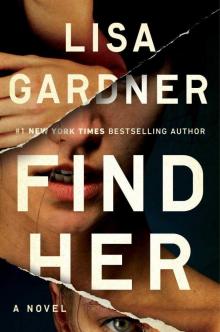 Find Her
Find Her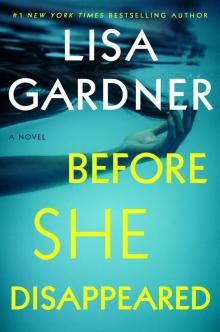 Before She Disappeared
Before She Disappeared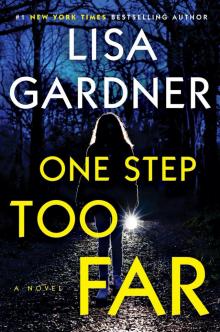 One Step Too Far
One Step Too Far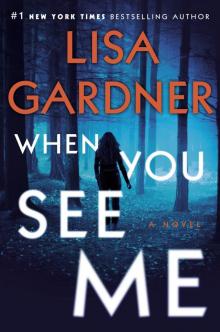 When You See Me
When You See Me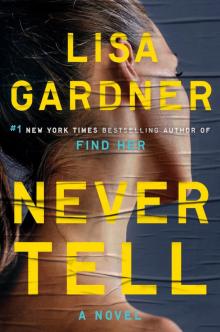 Never Tell
Never Tell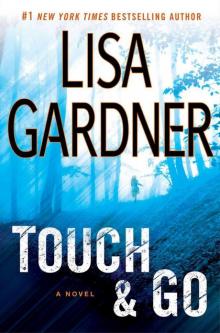 Touch & Go
Touch & Go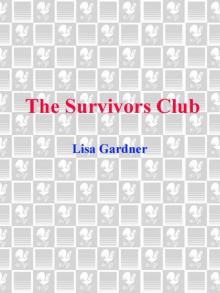 The Survivors Club
The Survivors Club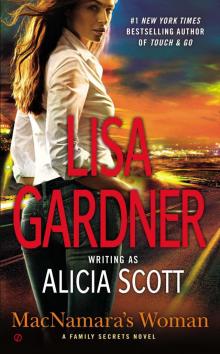 MacNamara's Woman
MacNamara's Woman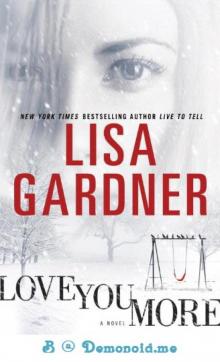 Love You More: A Novel
Love You More: A Novel Gone
Gone The Perfect Husband
The Perfect Husband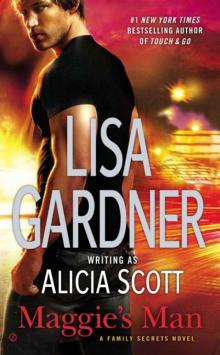 Maggie's Man: A Family Secrets
Maggie's Man: A Family Secrets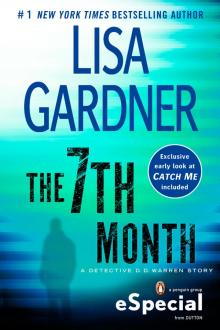 The 7th Month
The 7th Month The Neighbor
The Neighbor Hide
Hide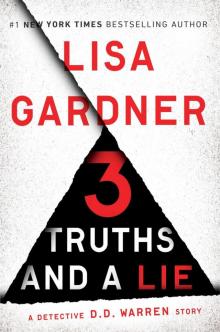 3 Truths and a Lie
3 Truths and a Lie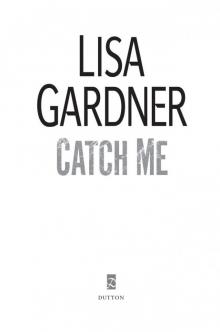 Catch Me
Catch Me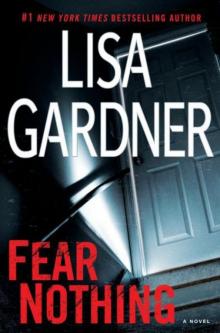 Fear Nothing: A Detective
Fear Nothing: A Detective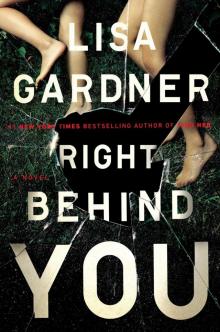 Right Behind You
Right Behind You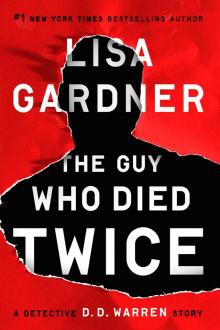 The Guy Who Died Twice
The Guy Who Died Twice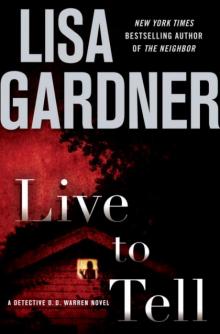 Live to Tell: A Detective D.D. Warren Novel
Live to Tell: A Detective D.D. Warren Novel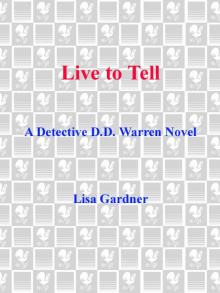 Live to Tell
Live to Tell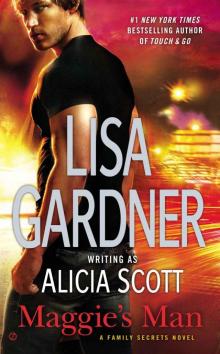 Maggie's Man: A Family Secrets Novel
Maggie's Man: A Family Secrets Novel The Other Daughter
The Other Daughter Alone
Alone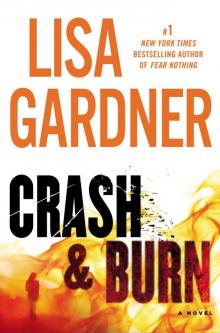 Crash & Burn
Crash & Burn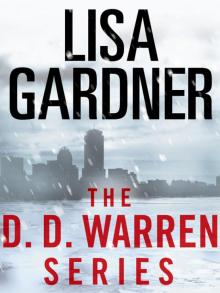 The Detective D. D. Warren Series 5-Book Bundle
The Detective D. D. Warren Series 5-Book Bundle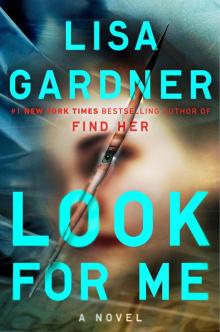 Look for Me
Look for Me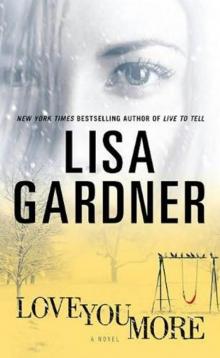 Love You More
Love You More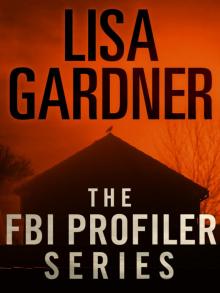 The FBI Profiler Series 6-Book Bundle
The FBI Profiler Series 6-Book Bundle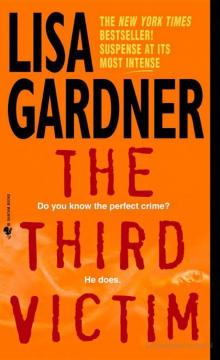 The Third Victim (Quincy / Rainie)
The Third Victim (Quincy / Rainie) Say Goodbye
Say Goodbye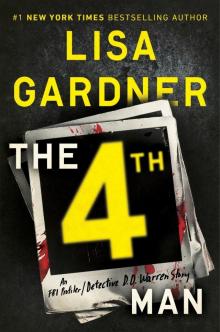 The 4th Man
The 4th Man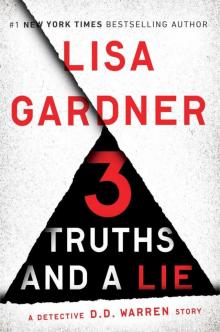 3 Truths and a Lie: A Detective D. D. Warren Story (Kindle Single)
3 Truths and a Lie: A Detective D. D. Warren Story (Kindle Single)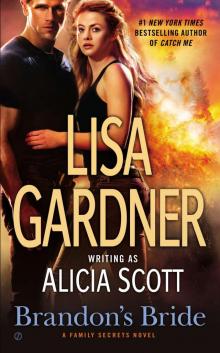 Brandon's Bride
Brandon's Bride